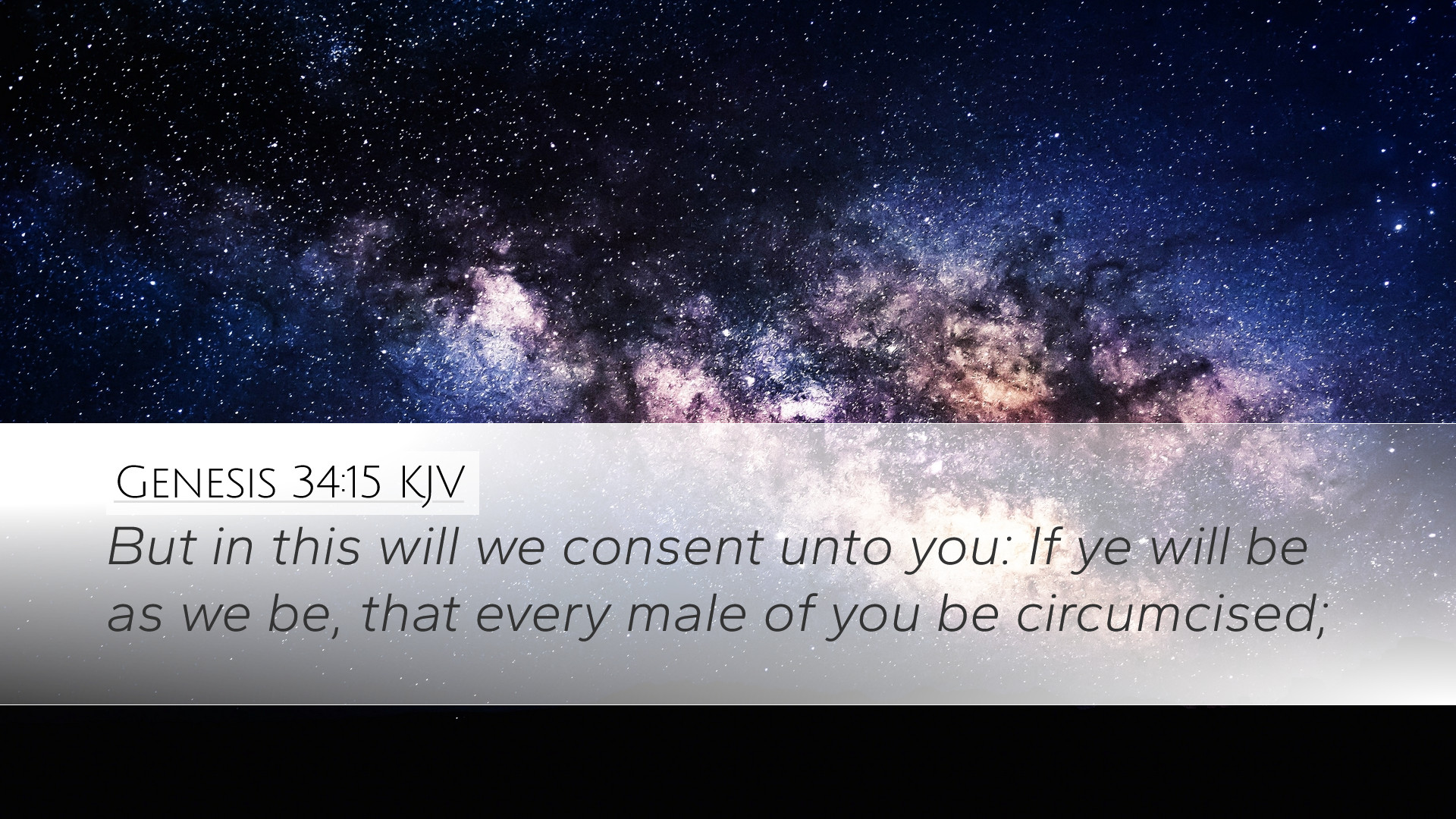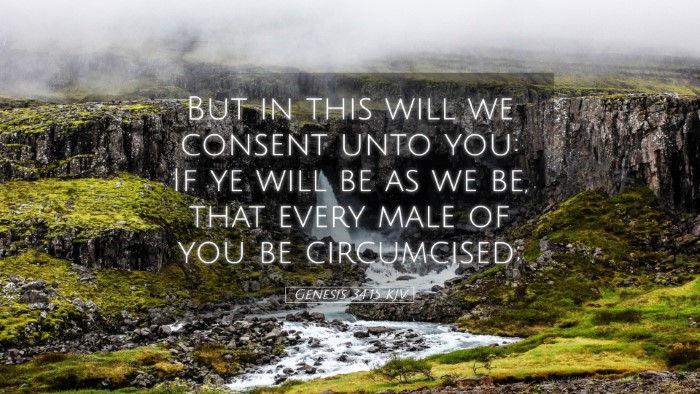Commentary on Genesis 34:15
Verse Reference: Genesis 34:15 - "But in this will we consent unto you: If ye will be as we are, that every male of you be circumcised."
Introduction
Genesis 34:15 recounts a pivotal moment in the narrative surrounding the family of Jacob, particularly the incident involving his daughter Dinah. This verse showcases the negotiation between Shechem, the son of Hamor the Hivite, and Jacob’s sons following the defilement of Dinah. Understanding the context and implications of this verse is critical for both theological reflection and pastoral application.
Contextual Background
The events leading to Genesis 34:15 are crucial for understanding the significance of the requests made by Jacob’s sons. Dinah, the only daughter of Jacob and Leah, goes out to visit the women of the land and is approached by Shechem, who subsequently violates her. Shechem's desire to marry Dinah leads to negotiations that illustrate the broader themes of covenant, identity, and the tension between Israel and the surrounding peoples.
Summary of Commentaries
- Matthew Henry: Matthew Henry underscores the gravity of Dinah’s situation and how it catalyzed a response from her brothers. The proposed condition of circumcision is not merely a physical act but symbolizes entrance into covenantal relationship and identity with God’s people. Henry points out that the negotiation presented by Jacob’s sons exposes their desire not only for reparation but also for a deeper clarity regarding their cultural and spiritual separation from the Canaanites.
- Albert Barnes: Barnes highlights the strategic nature of the brothers’ response. By making circumcision a pre-requisite for accepting Shechem's proposal, the sons aimed to ensure that the men of Shechem would adopt a significant aspect of the Hebrew people's identity. This act carries implications of acceptance and integration into a covenant community, thus reflecting both a shrewd tactic in securing justice for Dinah and a challenge to the Hivites to align with the covenant of Abraham.
- Adam Clarke: Clarke offers insight into the cultural practices of the time, explaining that circumcision had profound spiritual meaning among Abraham's descendants. He notes that the demand posed by Dinah's brothers was laden with irony—a demand for circumcision from those who were not part of the covenant community. Clarke emphasizes the potential for conversion as a result of this negotiation, indicating that the act of circumcision could represent more than mere compliance; it could serve as an entry point for Shechem and his family into the broader family of God.
Theological Implications
Theologically, Genesis 34:15 invites rich discussion regarding identity, covenant, and moral integrity. The request for circumcision can be seen as a profound moment wherein the sons of Jacob articulate the distinct nature of their faith and heritage. This request creates a boundary that delineates what it means to be a follower of Yahweh against the backdrop of surrounding pagan practices.
1. Covenant Identity
This passage emphasizes the importance of covenant identity. The act of circumcision is not simply a rite; it serves as a sign of belonging to God’s people. For pastors and theologians, this highlights a crucial aspect of ministry—inviting others into the community of faith while ensuring the integrity of that community remains intact.
2. Ethical Considerations
The ethical ramifications of this narrative are profound. Jacob's sons, while seeking justice for their sister, engage in deceit to achieve their ends. This raises significant questions about the means by which one may pursue justice and the broader implications of such actions. They invoke a severe measure to express their discontent, signaling to ministers and leaders the need for discernment and integrity in addressing sin and injustice in their contexts.
3. Cultural Engagement
In seeking to protect the sanctity of their family and faith, Jacob’s sons propose a cultural engagement that demands transformation rather than mere coexistence. This reminds modern readers of the necessity to engage with surrounding cultures thoughtfully, balancing the preservation of one’s faith with the call to evangelism and outreach.
Practical Application
For pastors and Bible scholars, the events surrounding Genesis 34:15 provide a foundational case study in how to navigate difficult ethical situations. The following applications can be drawn from this passage:
- Call for Restoration: Recognize the necessity for dialogues that lead to healing and restoration, much like the brothers sought to rectify the situation with Shechem.
- Understanding Cultural Identity: Facilitate discussions around what it means to uphold a Christian identity in a pluralistic society.
- Ethics in Leadership: Evaluate how ethical decisions are made in leadership and the consequences they bear on community integrity.
Conclusion
Genesis 34:15 is not merely a historical account; it provokes deep theological reflections and practical considerations for contemporary faith communities. Engaging with this verse and the surrounding narrative allows pastors, students, and scholars to distill timeless truths applicable both personally and communally. The call to integrity, justice, and covenant community resonates loudly in a world often marked by fragmentation and strife.


